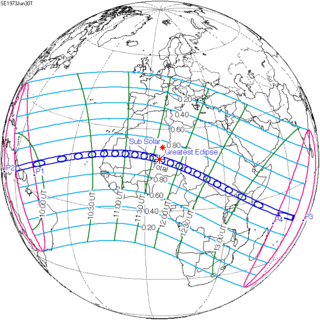| Solar eclipse of June 30, 1973 | |
|---|---|
| Type of eclipse | |
| Nature | Total |
| Gamma | −0.0785 |
| Magnitude | 1.0792 |
| Maximum eclipse | |
| Duration | 424 s (7 min 4 s) |
| Coordinates | 18°48′N 5°36′E / 18.8°N 5.6°E |
| Max. width of band | 256 km (159 mi) |
| Times (UTC) | |
| Greatest eclipse | 11:38:41 |
| References | |
| Saros | 136 (35 of 71) |
| Catalog # (SE5000) | 9450 |
A total solar eclipse occurred at the Moon's descending node of orbit on Saturday, June 30, 1973,[1][2] with a magnitude of 1.0792. A solar eclipse occurs when the Moon passes between Earth and the Sun, thereby totally or partly obscuring the image of the Sun for a viewer on Earth. A total solar eclipse occurs when the Moon's apparent diameter is larger than the Sun's, blocking all direct sunlight, turning day into darkness. Totality occurs in a narrow path across Earth's surface, with the partial solar eclipse visible over a surrounding region thousands of kilometres wide. Occurring about 11 hours after perigee (on June 30, 1973, at 0:50 UTC), the Moon's apparent diameter was larger.[3]
With a maximum eclipse of 7 minutes and 3.55 seconds, this was the last total solar eclipse that exceeds 7 minutes in this series. There will not be a longer total solar eclipse until June 25, 2150.
The greatest eclipse occurred in the Agadez area in the northwest of Niger not far from Algeria inside the Sahara Desert somewhat 40 km east of the small mountain of Ebenenanoua at 18.8 N and 5.6 E and occurred at 11:38 UTC.
The umbral portion of the path started near the border of Guyana and the Brazilian state Roraima, passed northern Dutch Guiana (today's Suriname), headed into the Atlantic, included one of the Portuguese Cape Verde (today's Cape Verde) Islands, which was Santo Antão, Nouadhibou and Nouakchott and other parts of Central Mauritania, northern Mali, the southernmost of Algeria, the middle and southeastern Niger, the middle of Chad, the Sudan including Darfur and parts that are now in the South Sudan including Kodok, a part of the northernmost Uganda, a part of northern Kenya, the southernmost of Somalia, and the Alphonse Group of British Seychelles (today's Seychelles). A partial eclipse was visible for parts of eastern South America, Africa, Southern Europe, and the Middle East.
- ^ "June 30, 1973 Total Solar Eclipse". timeanddate. Retrieved 8 August 2024.
- ^ Hatherill, Chris (March 9, 2016). "When Astronomers Chased a Total Eclipse in a Concorde".
- ^ "Moon Distances for London, United Kingdom, England". timeanddate. Retrieved 8 August 2024.
